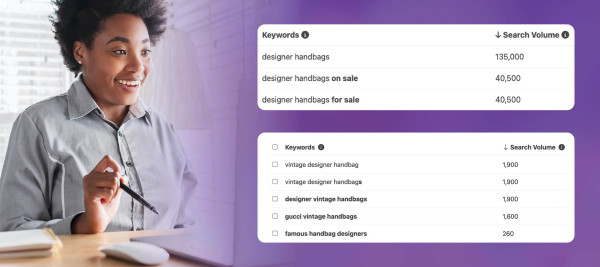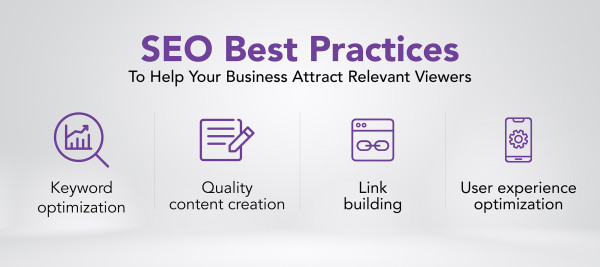
10 Compelling Reasons Your Business Needs a Solid SEO Plan For Its Website
Today’s digital landscape can be an overwhelming place to stand up and ask for everyone’s attention. How do you rise to the top and become the resource for those who are searching for topics, products, or services within your industry?
The answer lies in your Search Engine Optimization, or SEO, strategy.
Don’t have one? You need one. This article will give you 10 reasons why a solid SEO strategy can help your business grow traffic, leads, and conversions and how to get started with SEO today.
1. You Need to Attract Relevant Users
Quality SEO content attracts relevant users by improving the visibility of your website and ranking on search engine result pages (SERPs). When you have quality website content, you engage, inform, and delight your audience using creative, authentic, and valuable content.
How does this help your business?
When your website ranks higher in search results for relevant keywords, it heightens your chances of attracting organic traffic.
Consider this scenario:
You’re the CMO for a boutique shop that sells vintage designer handbags online and you need to increase sales. So, you use a big SEO keyword like "designer handbags" in your website's copy in hopes of driving traffic to your site. And, hey — you ARE getting traffic to your website, BUT that traffic is leaving as fast as it's coming in.

Why?
Because in order to execute SEO well, you need to understand the intent of the user. If you sprinkle a high-volume generalized keyword like “designer handbags” all over your website, you may be attracting people looking to buy new designer handbags, which is not the audience you want. You want the vintage handbag audience to buy your handbags.
So how do you attract prospective clients to your site? For starters, if you write a blog post or series of blog posts on your website that calls out a famous designer whose handbags you carry, or use a more precise term like “vintage designer handbag,” you are more likely to find the user you’re looking for, and vice versa.

A few good SEO practices that will help your business attract relevant viewers are:
- Keyword optimization — Keywords are words or phrases that users type into search engines when they are looking for a product, reviews, or information on a topic. Using keywords in your content helps get your website recognized and displayed in search results.
- Quality content creation — Writing compelling content will help your rankings. This means your actual website copy and also your meta titles and descriptions. If those are well written AND utilize keywords and phrases, your SEO rankings will improve.
- Link building — Do you know how many backlinks are pointing to your website? If other high-quality sites are pointing to your site, it improves the visibility of your site. This is an essential part of SEO.
- User experience optimization — User experience (UX) refers to how easy, or how difficult it is, to navigate a website on desktop or mobile devices.
More on these later.
By attracting more relevant users, you are able to expand your business and create lead customers.
2. You Need a Cost-Effective Marketing Strategy
When compared to other more conventional marketing strategies, SEO can be cost-effective compared to traditional tactics like paid advertising and paid search, which can have sizable upfront costs. Using SEO best practices, your company targets people who are searching for the goods or services you provide, which creates organic (ahem, free) traffic and leads. This results in lower advertising expenses and boosts long-term conversions. You will, however, need to invest time into your SEO practices, and may consider using a paid service to help run SEO audits, reports, and metrics.
3. You Need to Increase Organic Traffic and Credibility
Through the optimization of content using relevant keywords and phrases, your business will be able to increase visibility to potential customers.
But how do you create your list of keywords?
- Come up with a seed list. Jot down 10-15 words you think are relevant to your industry that people may use in online searches.
- Refine those keywords using keyword search tools to create a strong list of keywords. You can also use Google’s “People also ask” and “Related searches” to see what keywords and phrases users are actually typing into Google.
- Collect the best keywords and phrases that users are searching for related to your company/brand.
- Use those keywords in your meta titles and descriptions, titles, and copy.
- Use local keywords to optimize your local rankings (i.e. when a user searches for “local yoga studios near me”).
Remember, sometimes great copy can speak for itself. If you are forcing keywords into your copy, it’s not going to benefit your SEO rankings. If you’re really new to the game, use an SEO writing tool to score your writing and provide recommendations for SEO improvement.
4. You Need to Increase the Number of Leads You Receive
Lead generation and SEO activities can work together to drive more organic visitors to your site, increasing brand awareness.
A quick and easy way to increase your organic traffic is to update the content you already have.
- Identify any pages that haven’t been updated in the last year.
- Update and/or improve the content on that page.
- Add a blog to your existing site if you don’t already have one (but only do this if you can post quality content on a regular basis).
Your company will become more visible with the right SEO strategies in place, which will increase the amount of organic traffic to your website, resulting in more leads and more clients.
5. You Need Online Visibility
Increasing your business's online visibility is essential to ensuring your website is being put in front of your customers. When you add keywords into website elements such as meta descriptions, title tags, URLs, image alt tags, and headings it helps the search engine understand what your website is all about. In turn, your website will show up higher in search results and increase your visibility with your target audience. It’s the difference between being in the top 10 search results or showing up as number 352. After all, how often do you scroll past page 1 of Google’s search results?
If your business has a local niche, you need to focus on local SEO tactics and use a tool that can specifically target local SEO rankings.
6. You Need to Strengthen Your Online Reputation
Solid SEO practices can also double as reputation management. You improve your online reputation by utilizing backlinks, optimizing content, and anything else that would keep the first page of search engine results filled with positive information about your business. SEO provides a great opportunity to continue to build out your website and brand image.
Let’s focus on link building:
- Use a tool like Linktree in your social media profile to consolidate links to your site, landing pages, and other social media accounts for online users to easily navigate.
- Manually add links to your site by completing your company profile on various online directories like Google Business Profile, Yelp, Yahoo!, Microsoft Bing, Foursquare, and Superpages.com, to name a few.
- Link building means other sites are linking to your site, but be careful — you don’t want just any site (i.e. spam) linking to your site. You want other quality sites to recognize you for the amazing resource you are in that vertical. Which means you may have to ask those sites for those links. Research opportunities like association sites, community forums, blogs, and more.
- Once you have a few solid backlinks and have updated online directories, make sure you monitor the progress of your backlinks. It's important to ensure consistency in company contact information and links — after all, broken links can make your site look untrustworthy or outdated.

7. You Need to Create a Better User Experience
You can make your website search engine-friendly when you optimize it for SEO, but it's also a terrific chance to make it better for your audience. When designing your site, ask yourself:
- Does the navigation make sense?
- Do you have a sitemap?
- Does it look good on a desktop and on mobile devices?
- If you have an e-commerce site or checkout function, is it simple to use?
- Do the colors and fonts meet accessibility standards?
8. You Need Brand Awareness
Do you pick the projected first-pick quarterback in your fantasy football draft or the third-string for the worst team who’s last on the list?
The same goes for users who are searching on Google. We likely click on the first or one of the first available results, not the 32nd.
Greater brand awareness and engagement among your target audience or potential customers arise from increased brand exposure. Exposure increases the higher your business ranks in search engine results. The higher up you appear in search results, the more authority you have with your users and the more clicks you will receive.
Use tools that can identify strategies to help boost your on-page SEO by identifying weaknesses and areas of improvement.
9. You Need to Gain Customer Insights
An important component of SEO is metrics and measurement.
First, you need to identify your target audience. You can learn more about your audience and their search habits by utilizing SEO data. By studying the position ranking of your site overall and of your top keywords, you have the chance to fine-tune your content. With the right tools you can better understand your users' behavior, compare it to competitors, and pivot as needed to continually improve your SEO ranking.

10. You Need to Increase ROI
SEO is not only a cost-effective strategy, but it also produces long-term effects. There is limitless potential for increasing your ROI when using SEO correctly. Your company may use search engine optimization to target and attract visitors, raise website exposure, and increase conversions, all of which lead to more visitors, more brand awareness, or more sales.
You Don’t Have to Build Your SEO Foundation Alone
Through a sold SEO strategy, you build a stronger connection with your target market. If you have a small team, you may want to invest in SEO AI products to help execute your SEO campaigns.
But if you’re new to SEO and aren’t sure where to start, we can help. TRAINOR is your brand ingenuity partner — contact us today to learn how we can help your brand innovate, increase engagement, and drive performance to the next level with an SEO strategy tailored to your business.


